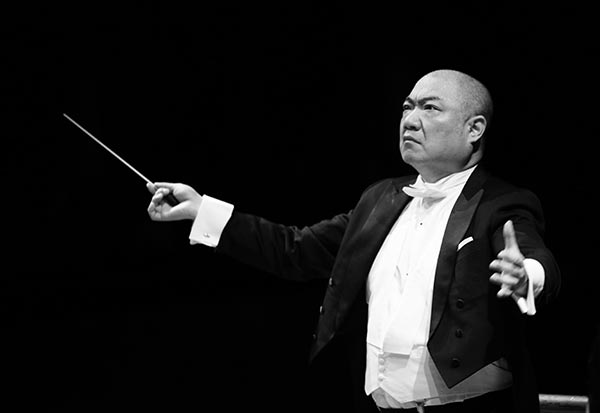 |
|
Pianist-turned-conductor Xu Zhong is one of the few Chinese musicians recognized by global audiences. [Photo provided to China Daily] |
During the "cultural revolution" (1966-76), classical music was forbidden. Xu recalls how his parents "had to use a duvet to cover windows and doors to minimize the sound" when he practiced at home.
He studied at the secondary school affiliated to the Shanghai Conservatory of Music. In 1986, with support from the Chow Ching Lie Foundation, he went to study at the Conservatoire National Superieur de Musique de Paris.
After winning several international competitions, Xu participated in the Tchaikovsky competition in 1994 and finished in fourth place, fulfilling his childhood dream as well as the expectation of his father.
Competing with fellow pianists helped him to see how good he was, and he pursued and won scholarships to further his studies abroad.
Later he served on the jury of some international piano competitions. In 2001, he founded the Shanghai Youth Piano Competition. Since then he has served as the artistic director.
Today a number of Chinese pianists are active on the international stage, and they make the news every now and then. Li Yundi, for example, has left his duty as a judge for the International Chopin Piano Competition to participate in the wedding of a movie star and pop idol in China.
That was a bad decision, Xu says, but he adds that the Chopin competition organizers were to be blamed as well.
"They should not have tolerated the unjustified absence of the judge-that will only undermine the prestige of the event."
Another Chinese star, Lang Lang, has had success that Xu says could not be copied.
"There will be pianists who play better, but it's unlikely any one of them can achieve such commercial success as Lang Lang has."
It takes discipline and hard work to remain on top as a soloist, Xu explains. Successful pianists, such as Lang and Wang Yujia, spend up to eight hours every day practicing before giving a recital.
While he is an artistically mature pianist, Xu has taken to conducting and administrative work. He is a member of the Shanghai Grand Theater Arts Group artistic committee and vice-president of the Shanghai Oriental Art Center arts committee.
As a conductor, he has worked with Orchestre National de France, Orchestre National de Lille, Orchestra de Cannes and Moscow State Symphony Orchestra.
These have always been learning opportunities, Xu says.
Sometimes pianists-turned-conductors are criticized for the lack of clarity and accuracy in their gestures. Xu has a "secret" to make it work.
A tenor he worked with used to say that singing under his baton "never felt tiring". It was because Xu made sure the orchestra's playing allowed the singer to breathe properly, and make full use of the singer's voice.
Xu says: "When you play for the opera, you need to make the music apt and well-fitted for the singer-so comfortable that it feels like velvet."
Related:
|
|
|
|
|
|
|
|
